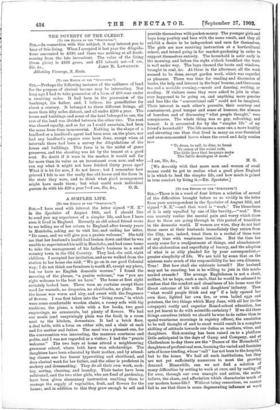A SIMPLER LIFE.
[To THE EDITOR OP THE " SPECTAT011.1
SIR,-/ have read with interest the letter signed "N. Z." in the Spectator of August 16th, and I should like to send you my experience of a simpler• life, and how I have seen it lived in England. Recently an old school friend wrote to me telling me of her return to England after twenty years in Manitoba, asking me to visit her, and ending her letter, "Do come, and we will give you a prairie welcome." She told me that her husband's health had broken down and that he was unable to superintend his mill in Manitoba, and had come home to take the management of his father's business in a small country town in the Old Country. They had, she said, eight children. I accepted her invitation, and as we walked from the station to her home she said: " We go on in our good Colonial way; I do not think our furniture is worth £5, except my piano, but we have no English domestic worries." I found the meaning of the phrase, "a prairie welcome," was "you are right welcome to the best we have." The home at first sight certainly looked bare. There were no curtains except those used for warmth, no draperies, no chairbacks, no plate. But the house was warm and airy, and sweet with the fragrance of flowers. I was first taken into the " living room," in which were some comfortable wooden chairs, a roomy sofa with big cushions, the piano, a table with a few books, two good engravings, no ornaments, but plenty of flowers. We had our meals (and surprisingly plain was the food) in a room next to the kitchen, downstairs. It had a brick floor, a deal table, with a form on either side, and a chair at each end for mother and father. The meal was a pleasant one, for the conversation was interesting, the manners courteous and polite, and I was not regarded as a visitor; I had the "prairie welcome." The two boys at home attend a neighbouring grammar school, where both have won scholarships. The daughters have been educated by their mother, and by attend- ing classes one has learnt typewriting and shorthand, and does clerical work for her father, and the other• is proficient in cookery and dressmaking. They do all their own work, cook- ing, sewing, cleaning, and laundry. Their tastes have been cultivated, and the two elder girls, who are fond of gardening, have been given elementary instruction enabling them to manage the supply of vegetables, fruit, and flowers for the house ; and in addition to this they grow enough to sell and provide themselves with pocket-money. The younger girls and boys keep poultry and bees with the same result, and they all exhibit a desire to be independent and earn for themselves. The girls are now receiving instruction at a horticultural school, and intend going in for market-gardening in order to support themselves entirely. The household is astir early in the morning, and before the eight o'clock breakfast the work is well under way. The boys cleaned the boots and windows, brought in coal, &c. At three in the afternoon all the work seemed to be done, except garden work, which was regarded as pleasure. There was time for reading and discussion of books, the help and interest in the boys' lessons, and then came tea and a sociable evening,—music and dancing, reciting, or reading. If visitors came they were asked to join in what- ever happened to be going on, and anything more genuine and less like the " conventional call " could not be imagined. Their interest in each other's pursuits, their courtesy and contentment, good temper and sense of humour, the absence of boredom and of discussing " what people thought," were conspicuous. The whole thing was so gay, refreshing, and honest. Is it accounted for by the "simpler life" of my friend's household P The life seems a sane one, a more healthy and elevating one than that lived in many an over-furnished and over-ornamented house where the creed and daily routine
is-
" To dress, to call, to dine, to break No canon of the social code, The little laws that lacqueys make The futile decalogue of mode."
[We devoutly wish that more men and women of small
means could be got to realise what a good place England is in which to lead the simpler life, and how much is gained in true comfort by living it.—En. Spectator.]










































 Previous page
Previous page